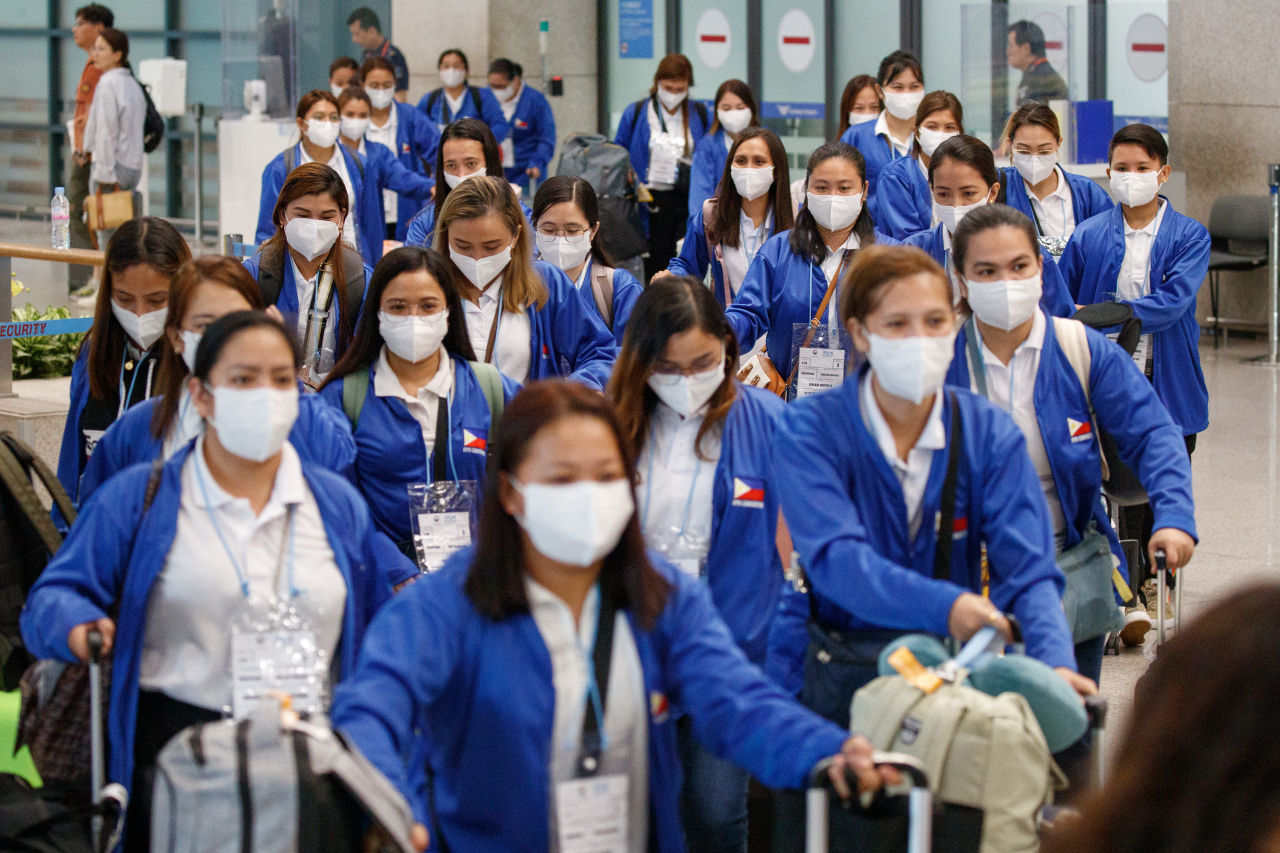 |
A hundred Filipina domestic helpers arrive at Incheon Airport on Aug. 6. (Pool photo via Yonhap) |
An aide to President Yoon Suk Yeol on Wednesday proposed a "private contract" or direct hire between South Korean individuals and foreign caregivers as a way to ease the cost burden for local households having difficulties balancing between work and family life, which she believes is one cause of the country's low birth rate.
You Hye-mi, senior secretary to the president for population policy, said in a KBS 1 Radio interview Wednesday that the government is looking for ways to quell complaints about Korean households' cost burden in the ongoing pilot project to hire caregivers via a domestic work service agent certified by the government. South Korea's legal hourly minimum wage stands at 9,860 won ($7.40).
"We are seeing complaints about the cost burden of Filipina foreign domestic helpers as South Korea's minimum wage applies to them. So we are trying to explore ways to mitigate an individual household's cost burden of hiring them and find rooms for improvement," she said.
The former professor of economics and finance at Hanyang University said one of the options to ease the burden could be to encourage households to directly hire foreign workers as "housekeepers" instead of hiring through intermediaries.
Korea's Minimum Wage Act applies to all employees except directly hired domestic workers. The current scheme is not exempt because the nannies are employed via an agency.
"As we look at the cases of Japan, Japan also uses Filipino caregivers and domestic workers. Those which have a higher cost burden are hired based on strict qualification requirements, while there are others hired and dispatched by agencies and others that are hired directly in the form of private contracts. In those cases of direct hires, a household may be able to cut the cost to half or one-third of the normal cost (of hiring a foreign worker as a caregiver)," said You, who specializes in macroeconomics and is a mother of twins.
You referred to Japan's foreign domestic worker policy in which an individual in areas designated as Japan National Strategic Special Zones may hire foreign workers through housekeeping service agents that sponsor their domestic worker visas.
Rep. Na Kyung-won of the conservative People Power Party said in a parliamentary forum Wednesday that the "discriminatory application" of the minimum wage to foreign domestic workers could be seen as "reasonable."
"In order to stimulate more foreign worker employment in the country, and make more South Korean citizens enjoy the benefit of the policy, a one-size-fits-all minimum wage policy should not be applied and we need to seek improvement," Na said in the forum held by the ruling party to raise the issue for public discussion.
These comments echoed the Bank of Korea's proposal in March through a report that argued for contracts between households and foreign nannies without intermediaries to pay the care workers below the statutory minimum wage.
The argument was based on the estimate that a household cost an average of 3.7 million won per month last year for care workers, which amounts to over 50 percent of the median income of households of people in their 30s. The central bank's proposal, coupled with Yoon's proposal in April to hire foreign students and marriage migrants as below-minimum-wage care workers, stirred criticism from labor activists here that the scheme is designed to deny the application of the minimum wage standard to a select group of people.
Korea has ratified International Labour Organization Convention No. 111, which prohibits any discrimination based on race, color, sex, religion, political opinion, national extraction or social origin, that impairs equality of opportunity and treatment in all areas of employment or occupation.
Earlier in August, 100 Filipina caregivers arrived in Seoul through a long-awaited six-month pilot program backed by the Ministry of Employment and Labor and Seoul Metropolitan Government. All caregivers, required to be between the ages of 24 and 38, are E-9 visa holders who speak English and basic Korean. They will be deployed to Seoul households after four weeks of training through early September.
You also said that more foreign workers could be utilized in South Korea to address the sharp decline in the country's working-age population, adding that devising a mid to long-term policy would be an important step to addressing this crisis.
"South Korea is not the only country trying to attract foreign workers," she said. "Other countries struggling with low birth rates are also trying to attract them, so there is competition overseas."
"So in that sense, we need to comprehensively examine how much more attractive our country can be to foreign nationals as an option," said the senior secretary.
Fewer South Koreans have been giving birth in recent years and society here is aging rapidly. As of 2023, South Korea's birth rate hit another fresh low of 0.72, down from 0.78 in 2022, while more than 1 in 5 South Koreans are projected to be aged 65 or older by 2025.











![[Today’s K-pop] Blackpink’s Jennie, Lisa invited to Coachella as solo acts](http://res.heraldm.com/phpwas/restmb_idxmake.php?idx=644&simg=/content/image/2024/11/21/20241121050099_0.jpg)